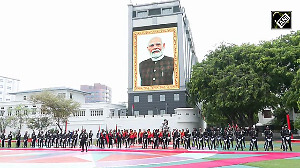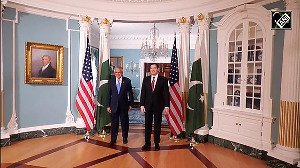Former ministers Yashwant Sinha and Arun Shourie, the Bharatiya Janata Party's two-man army, has been running a fierce political campaign against the Indo-US nuclear deal.
The United Progressive Alliance government and Prime Minister Manmohan Singh's dream project, the Indo-US civil nuclear deal, is being opposed by the Left and the BJP with equal vigour.
The BJP duo were excited on September 4 while addressing a press conference after the leak of a letter written by the US State Department to the US Congress's Foreign Affairs
Committee. It seemed as though after three years of relentless opposition they were feeling vindicated. They alleged that the prime minister was misleading the nation and should resign.
Former External Affairs Minister Yashwant Sinha's tone and intensity of argument, in conversation with Managing Editor Sheela Bhatt, suggests that whatever happens at the NSG on Friday, the "deal" will remain on shaky political ground.
Most experts, even Dr Anil Kakodkar, believes that there are no new revelations in the letter by the State Department, it is an internal matter of the US, so India need not worry.
People who don't see the new revelations in the State Department letter should revise their opinion on the working of the American system. Everyone knows US Congress is a powerful organ of US policies. Nothing is decided finally without the Congress's approval. Therefore to say that it is the internal matter shows a complete lack of understanding of the US system.
President Bill Clinton had signed the CTBT but US Congress refused to ratify it. Woodrow Wilson and the League of Nations is part of history so I need not to go into detail.
Look at the history of the nuclear legislation. When the US administration had sent a draft of the waiver legislation to Congress, which came to be known as the Hyde Act, it was just a three and a half page document. It was converted into a 40-page document by US Congress on the ground that they don't want to give the US president and administration as much flexibility as they wanted. The US wanted to keep its grip over this agreement. The US congress can reject something that is very dear to the heart of the president.
If you understand this basic dynamics of US politics you will never say that this is an internal matter and we are not concerned. This internal communication explains the matter in response to the very focused questions in a very focused manner on the various provisions of the 123 agreement. If we keep saying no, no, no, that shows complete foolishness on our part.
The US administration says if India tests (its nuclear capability) then the deal is off. If India tests then we will secure the return of all the material which have been supplied to India by not only the US but all the NSG countries. Still, the Indian government says we are not concerned by this interpretation. The US says it will not amend the law on which transfer of technology is dependent under the 123 agreement.
As far as fuel supply is concerned the State Department says there is no question of allowing India to build lifetime reserves. They say 'disruption' means only market disruptions, not disruption caused due to tests conducted by India.
The Indian government says this deal will end India's nuclear isolation. Two, it will give us design technology. Three, we will have assured fuel supply for the lifetime of the nuclear reactor. All three claims, as the letter explains, are non-starters.
That's why I feel and my party BJP feels that the intention of the US administration and US Congress has all along been, and even now it is, to draw India into the global non-proliferation regime. Is there a single question out of these 45 questions which is related to energy?
All the questions relate to non-proliferation. The Hyde Act and the 123 agreement talk about non-proliferation, so non-proliferation is the issue. They want India to accept conditionalities which are much more severe than the NPT or CTBT. Should we turn a blind eye to all these?
For domestic politics you do say certain things, as you do in election speeches in Bihar. Politicians do it all the time. Why don't you take these things as part of their domestic politics?
This is an absolutely wrong comparison. This letter is not an election speech that some US Congressman is giving. These are written assurances given to US Congress and the chairman of the Committee on Foreign Affairs. This is not a public speech by President George Bush.
No Madam, it is the written commitment and no US administration will go beyond this parameter.
What surprised you the most on reading this letter?
I wasn't surprised. We knew conditionality. It's a fact that the Government of India was misleading Parliament and the people. We were saying what the letter is saying. We were saying all along that these are the conditions, but the government is even now saying that 'we have the right to test'. It's like saying that I have the right to murder, it's only that I will have to suffer the consequences. The consequence of murdering somebody is death penalty, so is India prepared to accept the death penalty for going in for a nuclear test?
Your readers must know that there is going to be no such restrictions on Pakistan and on China. Why did India go for a nuclear test in 1974 and 1998? For our defence requirements. We had made the threat perception and we thought India must go nuclear.
Your two important neighbours are not going to be under any restrictive regime, it's only India that will be restricted. It doesn't suit us, only a mad person will say this is in our national interest.
Sometimes your diplomacy, your savvy argument is marred when you get personal against Dr Singh. In your press conference you talked about the PM's falsehood.
The PM's falsehood is exposed. Who defended this deal in the Rajya Sabha in August 2006? The PM defended it. Now, this letter suggests that what he said then was absolutely wrong. How will you describe this situation in words? That the PM was telling the truth? That he was being very wise?
You should allow space to the negotiators to say a few things. You can't have your cake and eat it, too. How can India conduct a test and still expect the world will not react?
You are turning the question on its head. The issue is this: in 1974 India went in for a nuclear test when India's stakes were limited. In 1998 when we went in for the nuclear test the stakes were higher. After concluding this agreement if we go in for a test it is like inviting the death penalty. Should India put itself in that vulnerable position? Should India agree for the death penalty? Why should we increase our stakes by agreeing to the conditionalities of the Hyde Act and the 123 agreement?
And, let me answer your charge that I am getting personal in hurling allegations. I didn't get personal. Take out my speech on the nuclear deal of August 18, 2006, in the Rajya Sabha. I didn't say anything against the PM. I tried to be as objective as possible. How did Dr Singh respond to that speech? He said Yashwant Sinha handed over to me a bankrupt economy in 1991. Where is the economy question coming up in a debate over the nuclear issue? Who is getting personal, me or the PM? We are criticising the PM because he said something, knowingly, which was wrong. He asserted that untruth.
Do you mean to say the PM is dishonest?
The PM has definitely not spoken the truth. Why are you talking to me now? Were you interviewing me yesterday or the day before? Because Berman has released this letter, which is an important event, you are meeting me.
It is argued that the way Berman's letter was released it is obvious that there is some global conspiracy by the anti-proliferation lobby to prevent India from getting nuclear fuel. Why don't you understand this?
Nobody understands this better than I do. That's why I believe that the time is not right for India to go and seek the kind of concessions that America was not prepared to offer to us. We still went around chasing a chimera, chasing a shadow. Everything has its own time. The time is not yet ripe for India. We should wait.
There are groups ganging up against India to prevent it from getting fuel from the international market.
I understand that. But, India doesn't need fuel. Again, it's a great myth that has been spread. They claim we are so short of fuel that we are dying. No, nothing of that kind is happening.
Are you sure what you are talking?
Absolutely sure.
If you remember, this government had taken a decision, a few months ago, to open up the uranium mines in Andhra Pradesh. And, the finance minister has gone on record to say that it will support 10,000 MW of electricity for 50 years. So what are we talking about? Why don't we exploit the (uranium) reserves in Meghalaya? Why don't we use the mines in Rajasthan? Why has the budget for uranium mining of the department of atomic energy been reduced this year? Dr Manmohan Singh is so keen on nuclear energy, but the finance ministry is consistently reducing the budget for nuclear mining?
Why then is this government pursuing this deal so vehemently?
Go and ask them. It is because if you read this letter then you know India is a lucrative market. The US's commercial interests are involved in this. If their commercial interests are involved, then other people's commercial interests are also involved on the Indian side.
What are the political implications of Berman's letter?
The political implications are that the US has made its position amply clear. The US has always been, transparently, making its position clear. I can't accuse the US of concealing anything or hiding anything. It is the Government of India which is not transparent, and opaque.
This letter is nine months old. It was sent as the authoritative statement of US policy and the US's interpretation of Hyde Act and 123 agreement, before India's agreement with the International Atomic Energy Agency and before the NSG discussions took place. I don't know why it is being released now. It is quite clear that Berman is not in favour of this deal. Earlier also he had issued a statement opposing the deal. Why should a person like Berman be allowed to decide India's fate?
How will it play up on the deal's prospects in US Congress?
NSG clearance or non-clearance is totally irrelevant now. Because, they might give language to India, they will only give semantics, but they (the NSG) will get the substance. We will be left with shadows in our hand. Let me also tell you that the US will make sure that no other country in the NSG will be allowed to give India any more concessions or commercial advantages that the US is prepared to give.
Again, I am sorry to use this word, the government is spreading a lie. The lie is that we will do a deal. Then, we will go to Russia and France and have agreements with them. And the US can go to hell!
No, no, no! You know the US is not a fool. They have clearly laid down that no country will give India any better terms than the US.
As the Opposition leader what are your options now? This government is ready to fight back.
This they have been doing for three years. It is not surprising. They have been defending every shift in goalposts by the US. I feel if this agreement goes through then it is the surest recipe for disaster for India's relations with the US. The interpretations of issues related to the Indo-US nuclear deal are so widely opposite that we will be having a great difficulty in implementing the agreement.
Didn't we (the government) say we have the right to take corrective steps? What does this nine-month old letter say? It says India has never explained what it means by corrective measures, so we are not concerned.
When the NSG passes the waiver what will be your reaction?
We will see the conditions and details of the waiver. But, I am very confident that we are not getting anything out of this deal. Nothing at all. We are not getting fuel, we are not getting technology. What are we getting out of it? Are we getting reactors to run on our fuel?
Foreign Minister Pranab Mukherjee said India has accepted a unilateral moratorium on testing. Is there a shift? Was it not voluntary, too?
He has been less than truthful. We had a unilateral but voluntary moratorium. This whole thing is based on a feeling within the government that India should not go in for tests. They were opposed to the 1998 test openly. They are not interested in reserving the right to test.
If the NSG delays a decision what it will mean?
My demand is this deal should not be done during the regime of George Bush and Dr Singh. Both of them are on their last legs. It should be left for renegotiations for the future government. Such important decisions should not be made by a government which proved its majority on the basis of purchased, bribed votes.
Many believe your party is divided on the issue of opposing the deal.
This perception is the creation of people who are supporting the deal. We are united. We have repeatedly said we want friendly relations with the US. But, we don't want strategic subservience, we don't want inequality.





